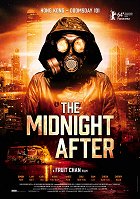Directed by:
Fruit ChanCast:
Simon Yam, Suet Lam, Kara Hui, Janice Man, You-Nam Wong, Vincci Cheuk, Cherry Ngan, Yuet-Ming Yiu, Wing-fu Cheung, Kelvin Chan Kin-long, Chi Zhang, Tien-you Chui (more)VOD (2)
Plots(1)
Seventeen Hong Kongers travel by night bus. Things become mysterious when the bus passes through a tunnel, and emerges into a completely deserted street. The group soon starts to question whether they may be the last people alive. A night like any other in the streets of Hong Kong: in the midst of the tangle of night-owls, cars and vendors, a group of passengers climb aboard a minibus that is to take them from Mongkok to Tai Po. The group is as diverse as the city: there's a young man on drugs, an arguing couple, a woman with prayer beads and a girl who has just fallen in love, and behind the wheel sits the chatty driver. As the bus emerges from a tunnel, everything is suddenly quite still: the streets and buildings are all empty and there's not a soul to be seen; it's as if everyone has suddenly been swallowed by the earth. Only the millions of neon lights continue to blink, as if nothing has happened. The eclectic group of passengers seek refuge in a deserted café and discuss what they should do... (Cinemax)
(more)Reviews (1)
This bizarre adaptation of a web-novel about a diverse group of people who are the only ones remaining in Hong Kong after a mysterious event reflects on the socio-political phenomena of Hong Kong and its population in recent years through the use of fantastically exaggerated passages, the consequences of the Fukushima nuclear power-plant disaster, the upcoming Hong Kong Legislative Council election, which highlights China’s influence on the self-governing region, and of course the future deadline of 2046. The premise involving the disappearance of all of Hong Kong’s people and the simultaneously disturbing and fascinating images of empty streets, which we are otherwise used to seeing full of people, refer to the concept of the “culture of disappearance” – the intensive search for Hong Kong’s identity and for the past and contemporary culture in a period when Hong Kong is faced with the threat of political and cultural assimilation into China. The result is a metaphor rich in meaning that resonates powerfully with the domestic audience, but which remains an impenetrable wall of strangeness for foreign viewers who lack the background necessary to decipher it.
()

